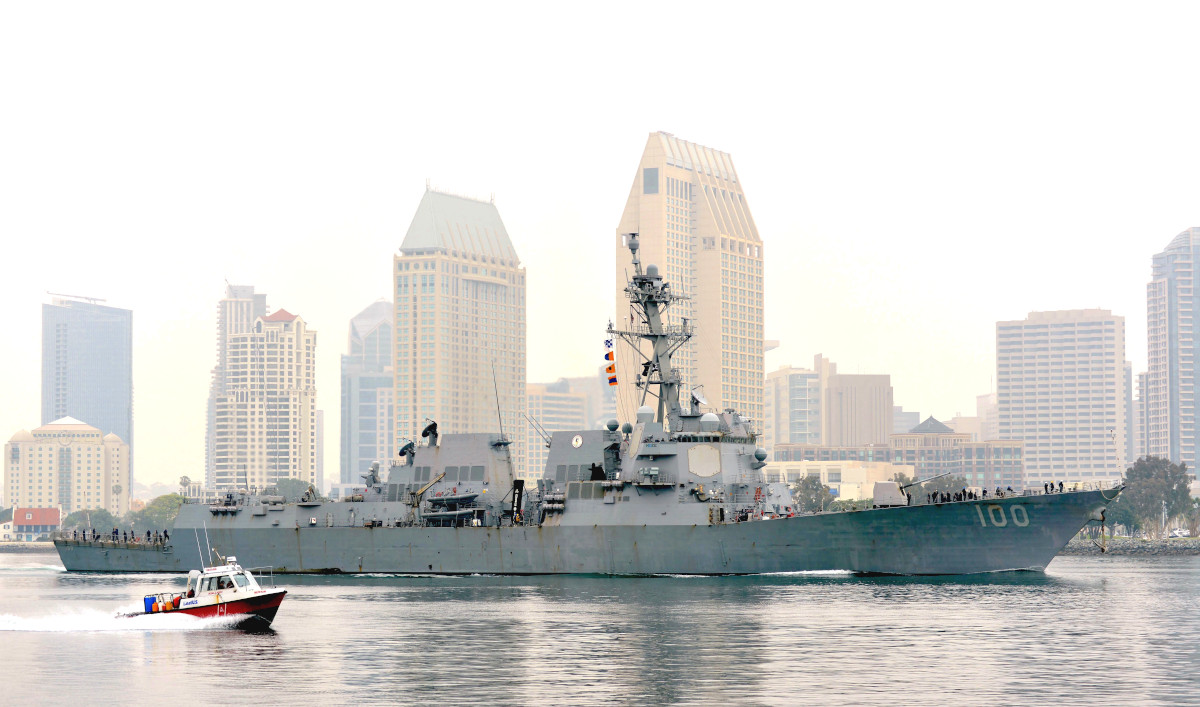The U.S. Navy has announced it will conduct a broader investigation into circumstances regarding a major outbreak of the COVID-19 novel coronavirus among the crew of the Nimitz class aircraft carrier USS Theodore Roosevelt. In doing so, the service has at least delayed implementation of a key recommendation from a preliminary review, that Captain Brett Crozier, the carrier’s former commanding officer, who was sacked over a letter warning about the serious risks the virus posed to his sailors, be given back command of that ship. This all comes at the Navy says that it is beginning to move previously quarantined personnel back onto Theodore Roosevelt as preparations begin to get it back out to sea after weeks of being docked in Guam.
Politico
was first to report that Acting Secretary of the Navy James McPherson had ordered the new review regarding the Theodore Roosevelt and Captain Crozier on Apr. 29, 2020, which the Navy subsequently confirmed. This decision reportedly came after pressure from U.S. Army General Mark Milley, the Chairman of the Joint Chiefs of Staff, who had also argued for this additional investigation to Secretary of Defense Mark Esper.
“After carefully reviewing the preliminary inquiry into the events surrounding the COVID-19 outbreak aboard USS Theodore Roosevelt (CVN 71), the Chief of Naval Operations, Adm. Mike Gilday, provided me with his recommendations,” Acting Secretary McPherson said in a statement to USNI News. “Following our discussion, I have unanswered questions that the preliminary inquiry has identified and that can only be answered by a deeper review.”
“Therefore, I am directing Adm. Gilday to conduct a follow-on command investigation,” the statement continued. “This investigation will build on the good work of the initial inquiry to provide a more fulsome understanding of the sequence of events, actions, and decisions of the chain of command surrounding the COVID-19 outbreak aboard USS Theodore Roosevelt.”
Former Acting Secretary of the Navy Thomas Modly fired Crozier earlier this month ostensibly over a breach of protocol over how specific the details were in his letter and his decision to send it over unclassified channels to a large number of recipients, increasing the likelihood it would leak to the press. It has since emerged that those assertions were, at best, misleading and that other members of the Captain’s chain of command may have also downplayed the situation on the Theodore Roosevelt and harangued officers on the carrier, saying their concerns were overblown.
Modly resigned more than four weeks ago now after the debacle turned into a political firestorm, inflamed by a bizarre speech he gave on the ship in Guam in which he slammed Crozier, the crew’s very public support for him even after his sacking, and the media. It’s also worth noting that Milley and Esper had both initially publicly supported the decision to relieve the Captain of his command, as had President Donald Trump. Trump had previously threatened to intervene after “hearing good things about both people,” referring to Modly and Crozier.
The entire discussion surrounding the COVID-19 outbreak on Theodore Roosevelt remains immensely political. Representative Adam Smith, a Washington state Democrat and Chairman of the House Armed Services Committee, who has been an outspoken supporter of the fired Captain, has already responded to the news, saying a follow-on investigation is “perfectly acceptable.”
However, “there was no reason to relieve him of his command,” he added. “I personally think Captain Crozier should be reinstated.”
At the time of writing, there have been 940 confirmed cases among the nearly 5,000 sailors assigned to the Theodore Roosevelt. At least six of these individuals had to be hospitalized and one, Aviation Ordnanceman Chief Petty Officer Charles Robert Thacker Jr., tragically died. Crozier himself contracted the virus and Modly had to go into self-quarantine after visiting the ship.
The cluster of cases on the carrier represents an amazing 70 percent of all confirmed COVID-19 cases within the U.S. Navy and a substantial portion of the total number of confirmed cases across the U.S. military, including civilian employees, contractors, and dependents.
Now the Navy has announced that it is working get the Theodore Roosevelt back out to sea. The carrier has been in Guam dealing with the outbreak since Mar. 27. There is work underway to get the more than 4,000 sailors who have tested negative for COVID-19 back on the ship following an extensive cleaning and decontamination process.
“After the ship’s arrival to Guam on March 27, approximately 700 Sailors remained on board to maintain critical ongoing operations and begin the cleaning. Since then, the ship underwent an aggressive, multi-pronged cleaning regimen, which balanced effective decontamination with protecting the ship’s critical systems,” according to the Navy. “Spaces were vacated for seven days – four days longer than the minimum recommended by the Centers for Disease Control – before being thoroughly disinfected. For spaces that were continuously operational, Sailors cleaned the area before leaving it, while the incoming Sailors cleaned it immediately upon arrival.”
There continue to be concerns and uncertainties about how long individuals who are asymptomatic or otherwise carrying the virus in a dormant state might remain at risk of developing symptoms or otherwise being contagious. The Navy is now dealing with another outbreak on the Arleigh Burke class destroyer USS Kidd, where the first cases emerged more than a month after its last port visit in Hawaii. So far, 64 sailors on that destroyer, which is now in port in San Diego, have tested positive for COVID-19 and a number have already been medically evacuated ashore.

The Navy kept the crew of the first-in-class USS Nimitz in quarantine for 27 days ahead of that carrier’s recent departure for pre-deployment exercises in an effort to prevent a potential outbreak, a decision that the service said was “taking advantage of lessons learned.” A member of that ship’s crew had tested positive for COVID-19 earlier in April, but was not on the ship at the time and was then placed in quarantine.
The U.S. military, as a whole, continues to weather criticism of its handling of the COVID-19 pandemic. On Apr. 27, ten Democratic Senators sent a letter to Defense Secretary Mark Esper complaining about unclear Department of Defense-wide guidance on how to mitigate and manage the spread of the virus, which they say has caused dangerous confusion at lower echelons of command. The Pentagon has disputed these assertions, but it is not the first time similar accusations have emerged.
All told, the new investigation and the deferral of any plans to reinstate Crozier mean the saga of the response to the USS Theodore Roosevelt COVID-19 outbreak, as well as the heated debate over the Pentagon’s response to the pandemic, is unlikely to end anytime soon.
Contact the author: joe@thedrive.com
